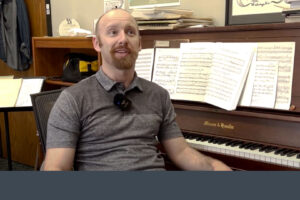Paula Poindexter, associate professor in the School of Journalism, is an expert on women and young voters, African American voters, polling and media coverage of elections. She is the co-editor of “Women, Men, and News: Divided and Disconnected in the News Media Landscape” (Lawrence Erlbaum Associates, Inc./Taylor and Francis 2008) and co-author with Maxwell McCombs of the textbook “Research in Mass Communication: A Practical Guide (Bedford/St. Martin’s 2000).”
When 23 million young people voted in the 2008 presidential election, they made history. It was the largest turnout of young voters in almost four decades, according to CIRCLE, the Center for Information and Research on Civic Learning and Engagement. The participation of this young age group, known more for its history of not voting than voting, sent a powerful message: Young voters matter.
But will young voters matter in 2010?
Since the number of voters in mid-term elections typically falls far short of turnout for a presidential election, there is no expectation that 23 million young people will cast a vote in 2010. And because according to a recent Gallup Poll, only 19 percent of young voters have even thought about this year’s election, expectations are pretty low that they will turn out in record numbers. Despite the fact that the election is not on young voters’ minds, there are at least three reasons they should make it a priority: respect, self-interest and civic responsibility.
Respect. Although Barack Obama’s 2008 bid for the White House may have been an exception, typically, candidates running for office, don’t respect young voters because, more often than not, young voters do not show up at the polls. But young voters did show up in 2008, which is probably why just one month before the 2010 elections, candidates are scrambling to attract young voters’ attention. President Barack Obama is campaigning on college campuses, encouraging young people to vote like they did in 2008. Candidates for governor in Texas are reaching out to young voters using social media and old-fashion get-out-the-vote techniques
Self-interest. If young voters were to spend time thinking about the 2010 mid-term election, they would quickly discover that issues they care about are on the table. Failing to inform themselves about the issues and the candidates’ positions could be detrimental to their self-interests.
One issue is how to best increase jobs and bring down unemployment. Unemployment for 20- to 24-year-olds is a record 15 percent according to NBC News. Another issue is health insurance. With one in three young adults without health insurance, there are more uninsured young adults than any other age group, according to the Department of Labor. The health care bill that was signed into law in July provides a safety net for young adults, allowing their parents to carry them on their insurance policies until age 26. Only by participating in the 2010 elections can young voters have a voice in how high unemployment is addressed and whether the young adult health insurance safety net is retained.
Civic responsibility. Only since the ratification of the 26th Amendment in 1971 have 18-, 19- and 20-year-olds been able to vote. Despite having this right, young adults have more often than not ignored their civic responsibility and skipped elections. Now that the 2010 elections are upon us, young voters have to decide if they want to turn civic irresponsibility into civic responsibility and cast a vote, not just in this election, but in every election going forward.
Showing up in 2010 would do a lot for the young voter image. It would likely put to rest the conventional political wisdom that young adults are apathetic and fickle. Participation in the 2010 elections would spotlight young voter issues, such as high unemployment for college graduates and the large number of uninsured in their age group. Participation in the mid-term election would demonstrate that young adults get it: voting matters and when young voters exercise their right to vote, they are a voting bloc to be respected and even feared by politicians who ignore them.
More election posts from Paula Poindexter:
Visit the mid-term elections blog series home page for a complete lineup of faculty experts’ analyses.



